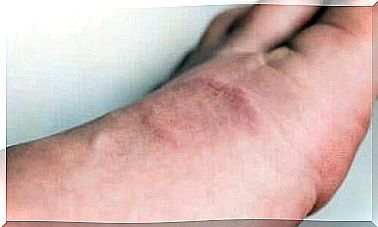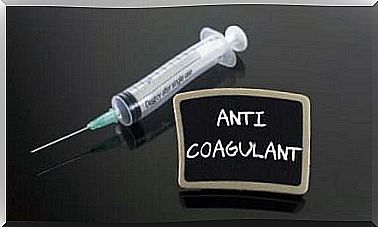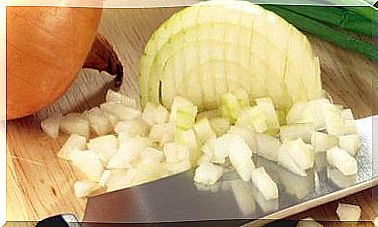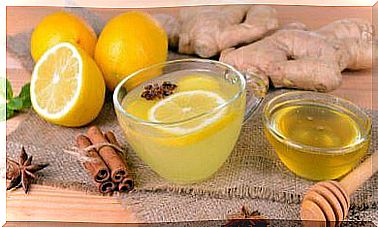How To Treat Nasal Polyps With 5 Homemade Solutions
If nasal polyps do not show improvement with these natural remedies, it is preferable to consult a specialist for a complete examination and follow a adequate treatment according to each particular case.
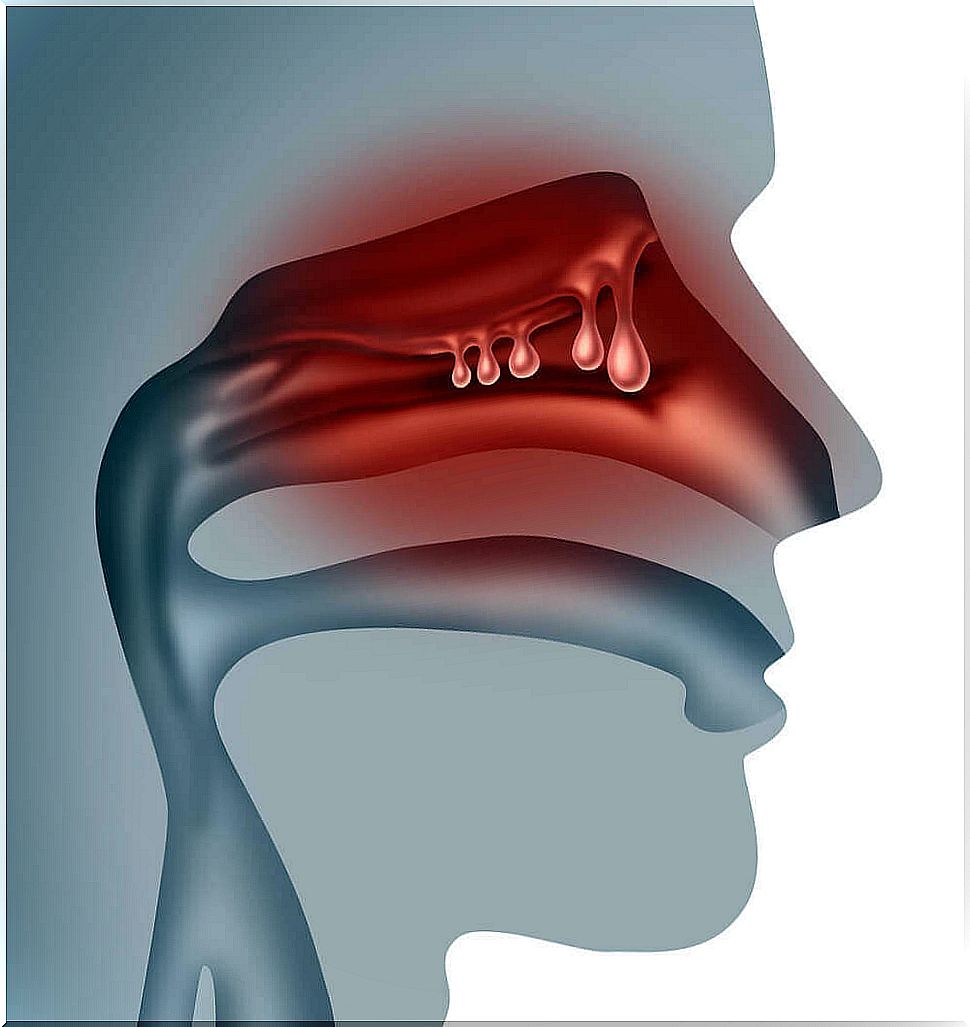
Nasal polyps are benign growths of the nasal lining covering the lining of the nasal sinuses.
Nasal polyps form in the sinuses of the nose, grow larger and erupt into the nasal cavity. They can occur at any age and acquire a large volume. Moreover, they can also obstruct the airways.
Constant or chronic allergies, infectious processes in the respiratory tract and some inflammations of the nasal mucosa can cause diseases such as nasal polyps. Usually, treatment for this condition involves the use of corticosteroids or even surgeries.
There is no way to prevent the appearance of nasal polyp. However, it is advisable to limit factors that promote inflammation of the airways such as stopping smoking in a smoker with nasal polyps.
Today in this article, we bring you several simple natural remedies to treat milder nasal polyps.
What are nasal polyps?

Nasal polyps are fluid-filled protrusions that develop in the paranasal sinuses and nasal passages. They look like tiny grapes inside the nostrils. They are usually painless, but they can be bothersome if you regularly suffer from allergies.
These polyps can be of different sizes. Therefore, while not a big deal for some people, they will need to be removed by surgery in other cases. This is one of the reasons why you need to treat nasal polyps in a timely manner.
Usually, polyps grow on the paranasal sinuses and obstruct them. For this reason, this disease is considered to be a variation of sinusitis, better known as polypoid sinusitis.
Causes of nasal polyps
The causes of nasal polyps can vary from case to case. The polyp can be the result of an allergy, allergic rhinitis, damage to the mucous membrane, or a bacterial or viral infection. When the nasal polyp is associated with asthma and an allergy to aspirin, it is called Widal syndrome. In this case, taking aspirin can trigger a severe asthma attack. Cystic fibrosis also predisposes to polyp formation. A genetic predisposition is also possible in the case of nasal polyps.
The main causes of nasal polyps have not yet been officially determined. However, according to the studies so far carried out, the following causes are the ones that seem most likely:
- Serious allergies that have not been treated properly
- Prolonged infections
- Asthma
- Alteration of the blood vessels responsible for mucosal irrigation
- Chronic inflammation of the nasal mucosa
- Anatomical dysfunctions that put too much pressure on the nostril
- Aspirin sensitivity
- Cystic fibrosis
- Allergic rhinitis
Symptoms of nasal polyps
When nasal polyps are small, the patient usually does not have symptoms and may even ignore the presence of these formations. However, as polyps grow, they can cause blockages in the nasal passages and make it easier for an infection to develop.
In many cases, when the nasal passages are completely blocked, the patient ends up breathing through the mouth. it is a chronic disease that affects the quality of life and causes significant discomfort.
Usually, the symptoms associated with nasal polyps are as follows:
- Nasal congestion which can cause a discharge called rhinorrhea
- Mild or moderate loss of odor
- Loss of mild or moderate sense of taste
- Headache
- Pain and pressure in the face and nasal area
- Cold symptoms
- Snoring
Treatments for nasal polyps
The diagnosis of nasal polyps is based on the observation of symptoms. The doctor orders a nasal fibroscopy as well as a sinus CT scan to confirm the diagnosis of nasal polyp.
To begin with, the doctor will prescribe drug therapy. These are topical corticosteroids, as a spray, to be sprayed into the nose over a period of ten days. This treatment is not curative but makes it possible to limit the symptoms by reducing the volume of the polyps. Another solution may be considered if the symptoms are not relieved by the spray: surgery.
When treating nasal polyps, doctors may often recommend injections and even surgery in some cases. Surgery, however, is only suitable for complete obstruction of one or both nostrils and when other treatments don’t work.
Performed by an ENT surgeon, it is a removal of the polyps (a polypectomy). Surgery is recommended in the presence of a single polyp, in front of recurrent polyps or in certain severe cases. Inflammation of polyps can also be prevented by treatment with antihistamines, in case of allergy. In all cases, it is recommended to carry out regular washing of the nasal passages.
Before going for surgery to remove nasal polyps, it is advisable to try other methods. Some natural remedies can reduce their size or prevent these protuberances from growing. That is why today we are offering you in this article 5 natural remedies to reduce or limit the development of nasal polyps.
5 homemade solutions to treat nasal polyps
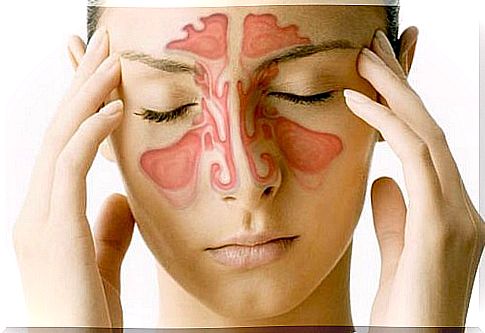
Home remedies are generally an inexpensive and easy to prepare option. In addition, in many cases, they can effectively contribute to the treatment of various diseases. Today we are going to take a look at the most used homemade solutions to treat nasal polyps. Discover them all!
1. Nasal wash saline solution to treat nasal polyps
A saline solution or salt water is very easy to prepare and helps to cleanse and decongest the nasal passages. This method also eliminates allergens that can cause the appearance of nasal polyps.
Ingredients
- 1 teaspoon of sea salt (5 g)
- 1 glass of hot water (200 ml)
Preparation
- Mix the water with the salt until dissolved.
- Use a dropper or empty bottle as a nasal spray.
- Apply directly into the nostrils and inhale so that the liquid passes through the entire nasal cavity.
- Repeat in each nostril about 3 times a day.
2. Radish and honey juice to treat nasal polyps
Radish is a root whose benefits in the treatment of respiratory tract diseases are well known. However, a lot of people don’t use it as much because it tastes slightly strong. This remedy combines radish juice with honey to facilitate its consumption and take advantage of all its properties.
Ingredients
- 1 bunch of radishes, grated (200 g)
- 1 cup of natural honey (250 ml)
Preparation
- Mix the grated radish with a cup of natural honey, preferably.
- Consume a teaspoon of this preparation in the morning and evening until you have finished mixing.
Note: It is advisable to let the strong spicy aromas of radish permeate your mouth well before swallowing this remedy. The benefits of radish and honey will help reduce nasal polyps.
3. Vitamin C to treat nasal polyps
Consuming citrus fruits, such as oranges, strawberries, grapefruit and lemons, strengthens the immune system thanks to their high content of vitamin C. The properties of vitamin C help reduce nasal polyps. These fruits also contain bioflavonoids, which are important for the health of tissues, such as the nasal lining and blood vessels.
Ingredients
- Citrus fruits of your choice (oranges, lemons, mandarins, etc.)
Preparation
- Eat one or two citrus fruits a day, preferably whole, although you can also consume them as juice with little sugar.
4. Steam inhalations to treat nasal polyps
This steam inhalation technique is widely used when you need to clean the nasal passages and reduce mucus secretions. There are several ways to perform these inhalations, but the ingredients are the same. In addition, water and certain medicinal plants are necessary to effectively treat this area.
Ingredients
- water
- mint or eucalyptus leaves
Preparation
- Boil the water in a saucepan with the mint or eucalyptus leaves.
- Pour the preparation into a large bowl.
- Place the face on the bowl containing the preparation and cover the head and neck with a cloth or towel.
- It is recommended that the towel cover both the head and the bowl to prevent steam from escaping.
- Take a deep breath to feel the steam in your nose and continue this process until the water cools.
Perform this treatment preferably in the evening for several nights to promote nightly rest and reduce nasal polyps.
5. Tea tree essential oil to treat nasal polyps
Thanks to its multiple antibacterial, antiviral, fungal, healing and anti-inflammatory properties, tea tree essential oil is an excellent home remedy for combating nasal polyps. It is very important to note that this oil should only be used topically, and preferably diluted, as it is also toxic.
To treat nasal polyps with tea tree essential oil, you can prepare this remedy as follows:
Ingredients
- 5 drops of tea tree essential oil
- 1 cup of hot water (250 ml)
- cotton swabs
Preparation
- Add the drops of tea tree essential oil to the hot water.
- Dip a cotton swab in this mixture and apply it to the polyps and deeper inside the nasal passages if the polyps are difficult to access.
- Another idea is to do steam inhalations with this same preparation. This method will also allow you to relieve nasal congestion and at the same time reduce nasal polyps.
If, despite the use of all these natural remedies, the symptoms of nasal polyps continue, it is best to consult a doctor in order to evaluate other treatment alternatives. Natural medicine is a first ally that allows us to relieve and provide quick solutions. Besides, nasal polyps have very high cure rate thanks to these natural remedies and remedies.
The paranasal sinuses are the bones that communicate with the nasal cavity. They are filled with mucus and are responsible for keeping the area moist, balancing the temperature of the air inlet, and relieving the weight of the bones. This is especially useful in winter, when nasal congestion becomes our main enemy. At this time of year, the cavities become inflamed and interrupt the functioning of the nose due to damage to the paranasal sinuses, which may be due to an infection, virus or allergy. Discover in this article 3 effective ways to cleanse the paranasal sinuses.




